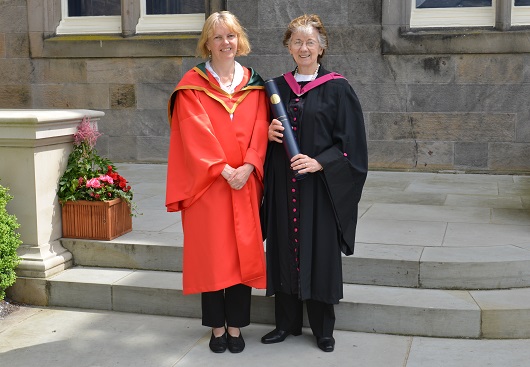Laureation address: Professor Rita Colwell

Laureation by Professor Anne Magurran, School of Biology, for Professor Rita Colwell, recipient of the Honorary Degree of Doctor of Science
Vice-Chancellor, it is my privilege to present for the degree of Doctor of Science, honoris causa, Professor Rita R Colwell.
Rita Colwell is an outstanding scientist whose research on microbiology and marine biotechnology has advanced knowledge, contributed to human wellbeing and influenced science policy at the highest level. Her research is concerned with global infectious diseases, and with the provision of safe drinking water for both the developed and the developing world. She has authored over 800 scientific papers and 17 books.
Much of Rita Colwell’s career has focused on the microscopic bacterium that causes cholera. The science of epidemiology began in 1854 when the medical scientist John Snow, working in London, found a link between cholera and unsafe drinking water. Snow’s pioneering work underlined the importance of preventing contamination of drinking water by sewage. However, the natural history of the cholera bacterium remained unknown. The breakthrough came when, as a young researcher in the 1960s, Rita Colwell discovered the cholera bacterium occurring naturally in the gut of zooplankton in Maryland’s Chesapeake Bay. Since then she, together with her team, has detected the bacterium in oceans, lakes and rivers across the world, including locations such as volcanic springs in Iceland where human sewage is absent. This work provides compelling evidence that the cholera bacterium is an inherent component of many aquatic ecosystems.
Rita Colwell’s subsequent research in the 1980s established that the bacterium has a dormant phase, explaining why it seemingly disappears between epidemics. Her work has exploited new advances in genomics and molecular biology to reveal how the cholera bacterium evolves in response to changing environmental conditions, and has used innovative modelling to predict the spread of epidemics. These analyses have uncovered an important link between the disease and climate change. Rita Colwell’s research, based on a fundamental understanding of the organism and the role its ecology plays in the transmission of disease, has been pivotal in demonstrating the importance of effective health care and water sanitation in controlling cholera.
Rita Colwell became the first woman Director of the United States National Science Foundation in 1998. She has also served as President of the American Association for the Advancement of Science and is a member of the United States National Academy of Sciences and the American Academy of Arts and Sciences as well as national academies in many countries. Amongst her many awards and honours are the Order of the Rising Sun, Gold and Silver Star, presented by the Emperor of Japan, the 2006 National Medal of Science conferred by George W Bush, as President of the United States, and the 2010 Stockholm Water Prize awarded by the King of Sweden. Colwell Massif, in Antarctica, was named in recognition of her polar research.
Rita Colwell’s prestigious career has not been immune to challenges and setbacks that will be familiar to other women scientists. For example, her attempt to obtain a graduate scholarship to work on bacteriology was thwarted by an advisor who felt that fellowships were wasted on women. Happily, the genetics department in Purdue University was more enlightened and her resulting Masters degree provided a firm foundation for her later work on cholera.
Unfortunately, there are still barriers preventing the participation of able researchers in science. In many countries these barriers continue to be experienced most keenly by women. The so-called ‘leaky pipeline’ of women in science threatens the ability of society to tackle urgent environmental and health problems. Rita Colwell works tirelessly through her involvement in international scientific societies, academies and advisory boards to ensure that everyone has the chance to achieve their potential and contribute to the advancement of science. Rita Colwell is an exceptional role model for women and men scientists. She exemplifies how science can change our understanding of the world, and our place in it.
We are delighted that Rita Colwell, together with her husband Jack Colwell, a physicist and colleague of the late Professor John F Allen, is able to join us in St Andrews today.
Vice-Chancellor, in recognition of her major contribution to science and science policy I invite you to confer the degree of Doctor of Science, honoris causa, on Professor Rita Colwell.
Category Awards